定语从句介词+which-介词+whom
- 格式:ppt
- 大小:2.08 MB
- 文档页数:30
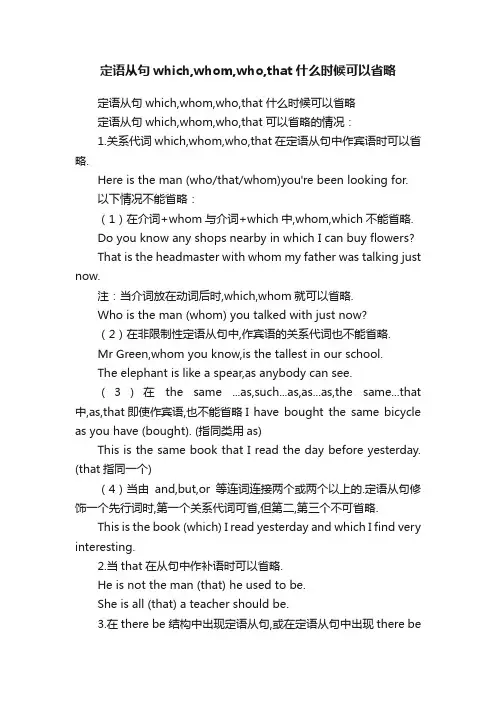
定语从句which,whom,who,that什么时候可以省略定语从句which,whom,who,that什么时候可以省略定语从句which,whom,who,that可以省略的情况:1.关系代词which,whom,who,that在定语从句中作宾语时可以省略.Here is the man (who/that/whom)you're been looking for.以下情况不能省略:(1)在介词+whom与介词+which中,whom,which不能省略.Do you know any shops nearby in which I can buy flowers?That is the headmaster with whom my father was talking just now.注:当介词放在动词后时,which,whom就可以省略.Who is the man (whom) you talked with just now?(2)在非限制性定语从句中,作宾语的关系代词也不能省略.Mr Green,whom you know,is the tallest in our school.The elephant is like a spear,as anybody can see.(3)在the same ...as,such...as,as...as,the same...that 中,as,that即使作宾语,也不能省略I have bought the same bicycle as you have (bought). (指同类用as)This is the same book that I read the day before yesterday. (that指同一个)(4)当由and,but,or等连词连接两个或两个以上的.定语从句修饰一个先行词时,第一个关系代词可省,但第二,第三个不可省略.This is the book (which) I read yesterday and which I find very interesting.2.当that在从句中作补语时可以省略.He is not the man (that) he used to be.She is all (that) a teacher should be.3.在there be 结构中出现定语从句,或在定语从句中出现there be时,用作主语的关系代词也可省略.There is a man downstairs (who) wants to see you.This is the best dictionary (that) there is in the library.4.状语的省略(1)当先行词是reason,而且定语从句中作原因状语时,关系代词可用why,that,也可以省略.The reason (why/that) he failed was his laziness.That is the reason (why) I did it.(2)当先行词是way,且在定语从句中作方式状语时,关系代词可用in which,that,也可以省略.The way (in which/that) these comrades look at problems is wrong.That was the way (in which/that) she worked the problem out.注意:当关系代词在定语从句中作主语时,不省略.例如:I don't know the way that/ which leads to the top of the mountains.(3)当先行词是time时,关系代词可用when,that 或省略.The second time (that) I saw him was in 1980.I don't know the exact time (when/that) the sports meet will take place.注意:关系代词作宾语有时也不能省略.。
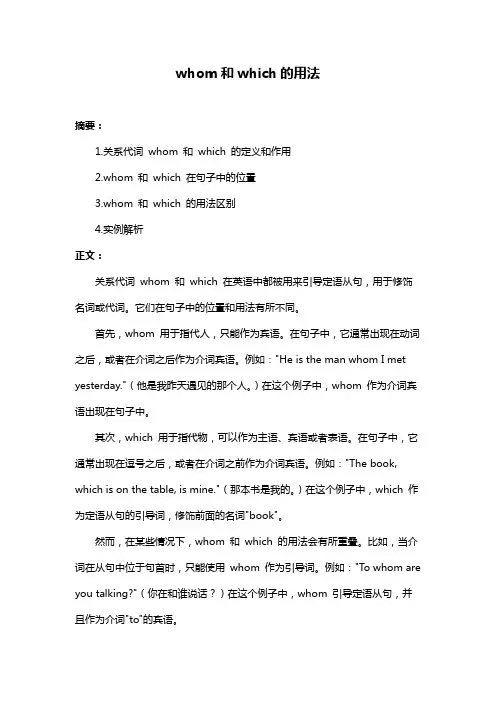
whom和which的用法
摘要:
1.关系代词whom 和which 的定义和作用
2.whom 和which 在句子中的位置
3.whom 和which 的用法区别
4.实例解析
正文:
关系代词whom 和which 在英语中都被用来引导定语从句,用于修饰名词或代词。
它们在句子中的位置和用法有所不同。
首先,whom 用于指代人,只能作为宾语。
在句子中,它通常出现在动词之后,或者在介词之后作为介词宾语。
例如:"He is the man whom I met yesterday."(他是我昨天遇见的那个人。
)在这个例子中,whom 作为介词宾语出现在句子中。
其次,which 用于指代物,可以作为主语、宾语或者表语。
在句子中,它通常出现在逗号之后,或者在介词之前作为介词宾语。
例如:"The book, which is on the table, is mine."(那本书是我的。
)在这个例子中,which 作为定语从句的引导词,修饰前面的名词"book"。
然而,在某些情况下,whom 和which 的用法会有所重叠。
比如,当介词在从句中位于句首时,只能使用whom 作为引导词。
例如:"To whom are you talking?"(你在和谁说话?)在这个例子中,whom 引导定语从句,并且作为介词"to"的宾语。
在英语写作中,正确使用whom 和which 是非常重要的,因为它们可以帮助我们更清晰、准确地表达思想。
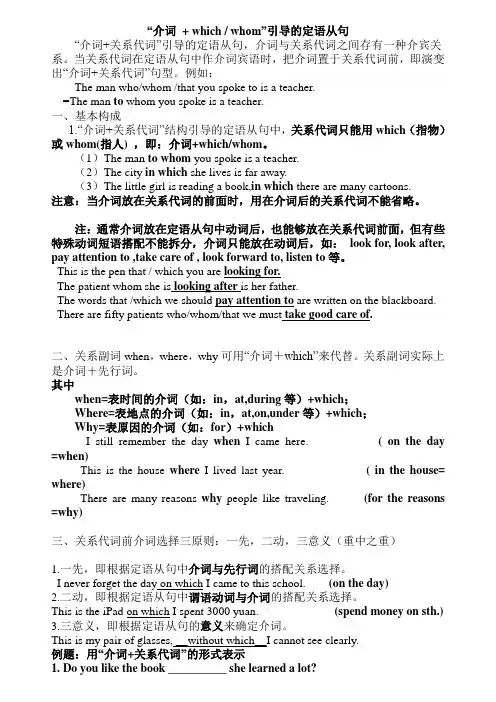
“介词+ which / whom”引导的定语从句“介词+关系代词”引导的定语从句,介词与关系代词之间存有一种介宾关系。
当关系代词在定语从句中作介词宾语时,把介词置于关系代词前,即演变出“介词+关系代词”句型。
例如:The man who/whom /that you spoke to is a teacher.=The man to whom you spoke is a teacher.一、基本构成1.“介词+关系代词”结构引导的定语从句中,关系代词只能用which(指物)或whom(指人) ,即:介词+which/whom。
(1)The man to whom you spoke is a teacher.(2)The city in which she lives is far away.(3)The little girl is reading a book,in which there are many cartoons.注意:当介词放在关系代词的前面时,用在介词后的关系代词不能省略。
注:通常介词放在定语从句中动词后,也能够放在关系代词前面,但有些特殊动词短语搭配不能拆分,介词只能放在动词后,如:look for, look after, pay attention to ,take care of , look forward to, listen to等。
This is the pen that / which you are looking for.The patient whom she is looking after is her father.The words that /which we should pay attention to are written on the blackboard. There are fifty patients who/whom/that we must take good care of.二、关系副词when,where,why可用“介词+which”来代替。
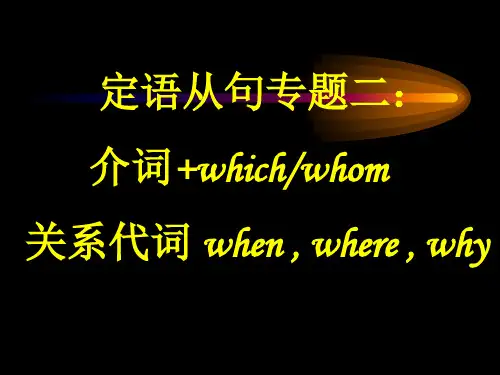
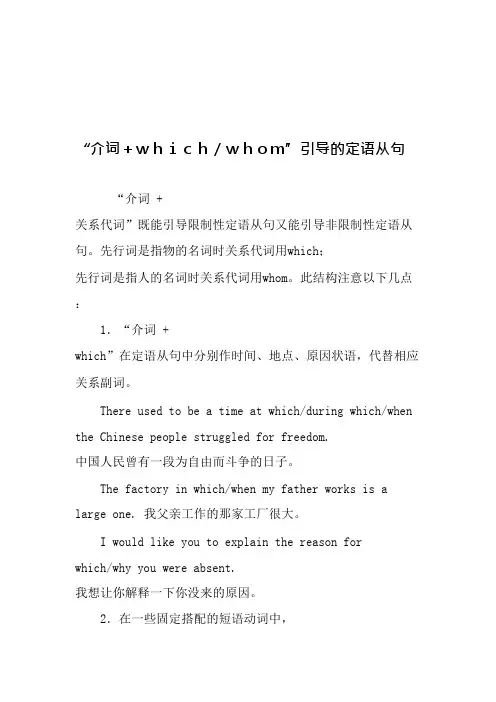
“介词+which/whom”引导的定语从句“介词 +关系代词”既能引导限制性定语从句又能引导非限制性定语从句。
先行词是指物的名词时关系代词用which;先行词是指人的名词时关系代词用whom。
此结构注意以下几点:1.“介词 +which”在定语从句中分别作时间、地点、原因状语,代替相应关系副词。
There used to be a time at which/during which/when the Chinese people struggled for freedom.中国人民曾有一段为自由而斗争的日子。
The factory in which/when my father works is a large one. 我父亲工作的那家工厂很大。
I would like you to explain the reason forwhich/why you were absent.我想让你解释一下你没来的原因。
2.在一些固定搭配的短语动词中,由于动词和介词不可分割,因此不能把介词置于关系代词之前。
This is the pen which I’m looking for.这是我正在找的那支钢笔。
不可以说:This is the pen for which I’m looking.常见的不可拆开的动词短语有:care for关心,喜欢;deal with处理,对付;hear from收到某人的信;look for寻找;look after照顾;send for 派人去请;see to照顾,料理。
3.“名词+ of which”代替“whose +名词”在定语从句中作定语。
The book, the cover of which/of which thecover/whose cover is black belongs to me.那本封面是黑色的书是我的。
I saw some trees, the leaves of which/whoseleaves/of which the leaves were black with diseases. 我看见一些树,它们的叶子因得病而发黑。
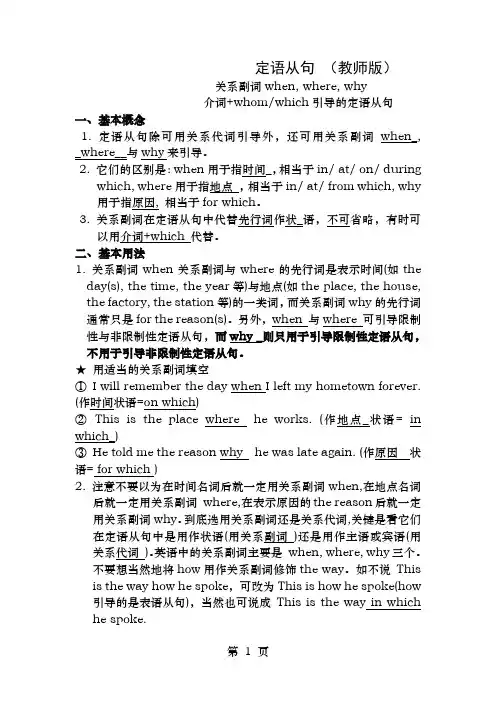
定语从句(教师版)关系副词when, where, why介词+whom/which引导的定语从句一、基本概念1. 定语从句除可用关系代词引导外,还可用关系副词when_, _where__与why来引导。
2. 它们的区别是:when用于指时间_,相当于in/ at/ on/ duringwhich, where用于指地点,相当于in/ at/ from which, why 用于指原因, 相当于for which。
3. 关系副词在定语从句中代替先行词作状_语,不可省略,有时可以用介词+which 代替。
二、基本用法1. 关系副词when关系副词与where的先行词是表示时间(如the day(s), the time, the year等)与地点(如the place, the house, the factory, the station等)的一类词,而关系副词why的先行词通常只是for the reason(s)。
另外,when 与where 可引导限制性与非限制性定语从句,而why _则只用于引导限制性定语从句,不用于引导非限制性定语从句。
★用适当的关系副词填空①I will remember the day when I left my hometown forever. (作时间状语=on which)②This is the place where he works. (作地点_状语= in which_)③He told me the reason why he was late again. (作原因状语= for which )2. 注意不要以为在时间名词后就一定用关系副词when,在地点名词后就一定用关系副词where,在表示原因的the reason后就一定用关系副词why。
到底选用关系副词还是关系代词,关键是看它们在定语从句中是用作状语(用关系副词)还是用作主语或宾语(用关系代词)。
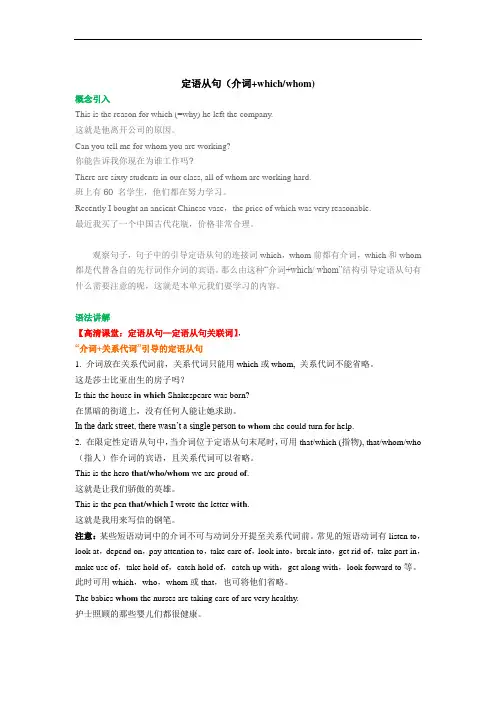
定语从句(介词+which/whom)概念引入This is the reason for which (=why) he left the company.这就是他离开公司的原因。
Can you tell me for whom you are working?你能告诉我你现在为谁工作吗?There are sixty students in our class, all of whom are working hard.班上有60 名学生,他们都在努力学习。
Recently I bought an ancient Chinese vase,the price of which was very reasonable.最近我买了一个中国古代花瓶,价格非常合理。
观察句子,句子中的引导定语从句的连接词which,whom前都有介词,which和whom 都是代替各自的先行词作介词的宾语。
那么由这种“介词+which/ whom”结构引导定语从句有什么需要注意的呢,这就是本单元我们要学习的内容。
语法讲解【高清课堂:定语从句—定语从句关联词】,“介词+关系代词”引导的定语从句1. 介词放在关系代词前,关系代词只能用which或whom, 关系代词不能省略。
这是莎士比亚出生的房子吗?Is this the house in which Shakespeare was born?在黑暗的街道上,没有任何人能让她求助。
In the dark street, there wasn’t a single person to whom she could turn for help.2. 在限定性定语从句中,当介词位于定语从句末尾时,可用that/which (指物), that/whom/who (指人)作介词的宾语,且关系代词可以省略。
This is the hero that/who/whom we are proud of.这就是让我们骄傲的英雄。
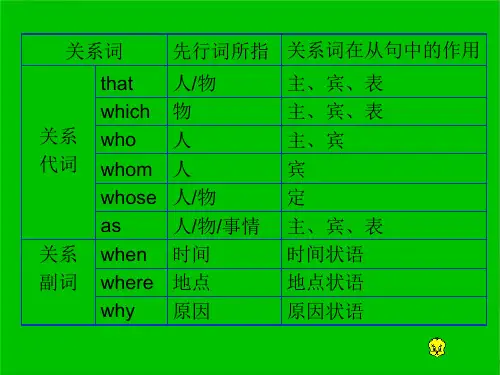
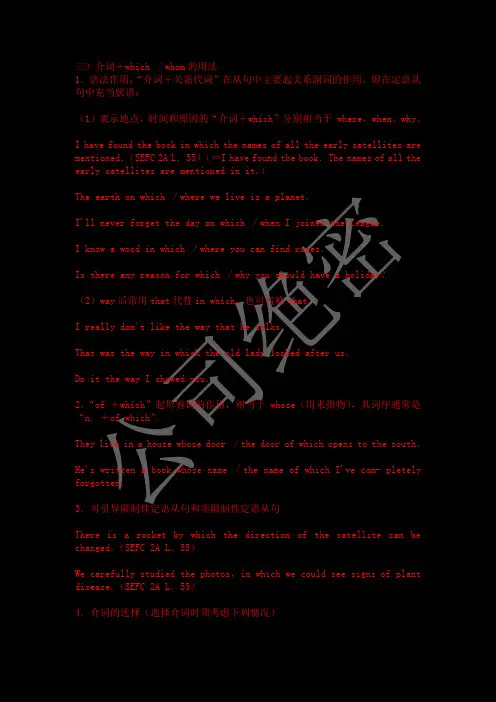
三)介词+which /whom的用法1.语法作用:“介词+关系代词”在从句中主要起关系副词的作用,即在定语从句中充当状语:(1)表示地点,时间和原因的“介词+which”分别相当于 where,when,why。
I have found the book in which the names of all the early satellites are mentioned.(SEFC 2A L.55)(=I have found the book.The names of all the early satellites are mentioned in it.)The earth on which /where we live is a planet.I'll never forget the day on which /when I joined the League.I know a wood in which /where you can find roses.Is there any reason for which /why you should have a holiday?(2)way后常用that代替in which,也可省略that。
I really don't like the way that he talks.That was the way in which the old lady looked after us.Do it the way I showed you.2.“of +which”起形容词的作用,相当于whose(用来指物),其词序通常是“n.+of which”。
They live in a house whose door /the door of which opens to the south.He's written a book whose name /the name of which I've com- pletely forgotten.3.可引导限制性定语从句和非限制性定语从句There is a rocket by which the direction of the satellite can be changed.(SEFC 2A L.55)We carefully studied the photos,in which we could see signs of plant disease.(SEFC 2A L.55)4.介词的选择(选择介词时须考虑下列情况)1)介词与先行词的习惯搭配There is no way in which it could be brought back to the earth.(SEFC 2A L.55)(in与way是习惯搭配)2)介词与定语从句中的动词,形容词的习惯搭配These are the wires with which different machines are connected.(be connected with是习惯搭配)The author with whom all of us are familiar will visit our compa-ny.(be familiar with是习惯搭配)3)同形的先行词,或定语从句中的动词,形容词表示不同的含义时,要根据其含义选用不同的介词。
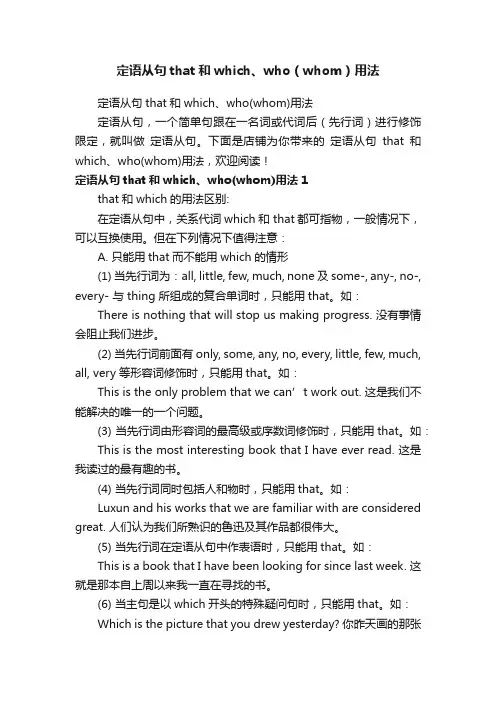
定语从句that和which、who(whom)用法定语从句that和which、who(whom)用法定语从句,一个简单句跟在一名词或代词后(先行词)进行修饰限定,就叫做定语从句。
下面是店铺为你带来的定语从句that和which、who(whom)用法,欢迎阅读!定语从句that和which、who(whom)用法1that和which的用法区别:在定语从句中,关系代词which和 that都可指物,一般情况下,可以互换使用。
但在下列情况下值得注意:A. 只能用that而不能用which的情形(1) 当先行词为:all, little, few, much, none 及 some-, any-, no-, every- 与 thing 所组成的复合单词时,只能用that。
如:There is nothing that will stop us making progress. 没有事情会阻止我们进步。
(2) 当先行词前面有only, some, any, no, every, little, few, much, all, very等形容词修饰时,只能用that。
如:This is the only problem that we can’t work out. 这是我们不能解决的唯一的一个问题。
(3) 当先行词由形容词的最高级或序数词修饰时,只能用that。
如:This is the most interesting book that I have ever read. 这是我读过的最有趣的书。
(4) 当先行词同时包括人和物时,只能用that。
如:Luxun and his works that we are familiar with are considered great. 人们认为我们所熟识的鲁迅及其作品都很伟大。
(5) 当先行词在定语从句中作表语时,只能用that。
如:This is a book that I have been looking for since last week. 这就是那本自上周以来我一直在寻找的书。
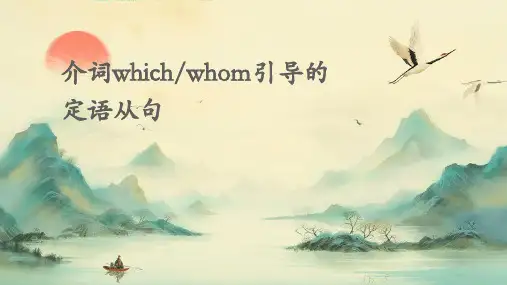
第四章 | 定语从句引导词之介词+which/whom今天这篇文章是要教大家顿悟定语从句引导词之“介词+which/whom”。
其实在前面我们已经讲到了许多关于“介词+which/whom”做引导词的情况,同学们应该有了初步的印象,此时的which或whom在从句中担任的正是其前面介词的宾语。
语法名词:定语从句的引导词之介词+which/whom核心讲解:我们先来看两个例子:1. 我赞成你坚持的那个观点。
首先,这个句子可以拆分成两个简单句:① 我赞成那个观点。
I agree with the idea.② 你坚持那个观点。
You insist on the idea.其次,依据最上面的中文意思,①肯定是主干,②肯定是修饰成分。
两个句子重复了“the idea”,为了避免重复,把②里面的“the idea”替换成“which”这样的代词,就变成了定语从句。
① 我赞成那个观点。
I agree with the idea.② 你坚持那个观点。
You insist on which.最后,把on which提到②前面,再把②放到①后面,变成:I agreewith the idea on which you insist.“介词+which”做引导词就是这样来的。
2. 这是昨天和我一起打羽毛球的那个男孩。
首先,这个句子可以拆分成两个简单句:① 这是那个男孩。
This is the boy.② 我昨天和那个男孩一起打羽毛球。
I played tennis with the boy yesterday.其次,依据最上面的中文意思,①肯定是主干,②肯定是修饰成分。
两个句子重复了“the boy”,为了避免重复,把②里面的“the boy”替换成“whom”这样的代词,就变成了定语从句。
用whom是因为在介词with后面。
① 这是那个男孩。
This is the boy.② 我昨天和那个男孩一起打羽毛球。
I played tennis with whom yesterday.最后,把with whom提到②前面,再把②放到①后面,变成:This is the boy with whom I played tennis yesterday.所以,当先行词为物,引导词在从句中担任介词的宾语时,引导词用which,介词提前,构成“介词+which”的形式;当先行词为人,引导词在从句中担任介词的宾语时,引导词用whom,介词提前,构成“介词+whom”的形式。
定语从句中关系代词的选择定语从句是英语中一种常见的修饰结构,通过引导词(关系代词)来连接主句和从句,进一步修饰名词或代词。
在选择关系代词时,需要根据从句在主句中所起的作用以及先行词的词性和含义进行判断。
本文将探讨定语从句中关系代词的选择。
一、关系代词的种类与用法定语从句中常用的关系代词有:that, who, which, whom, whose。
它们在从句中的作用及用法如下:1. that: 用于指物的定语从句中,可以做主语或宾语。
例句:I have a friend that/whom I trust deeply.(我有一个我深信不疑的朋友)2. who: 用于指人的定语从句中,多用作主语。
例句:She is the girl who won the first prize.(她是获得一等奖的那个女孩)3. which: 用于指物的定语从句中,多用作主语或宾语。
例句:He was reading a book which interested him.(他正在读一本他感兴趣的书)4. whom: 用于指人的定语从句中,多用作宾语。
例句:I know a doctor whom you can trust.(我认识一个你可以信任的医生)5. whose: 用于指人或物的定语从句中,表示所属关系。
例句:This is the man whose car was stolen.(这是那个车被偷的人)二、关系代词的正确选择在选择关系代词时,需要注意以下几点:1. 先行词的词性:根据先行词是人还是物选择关系代词,如人用who或whom,物用that或which。
2. 关系代词在从句中的作用:如果关系代词在从句中作宾语,则选择that、whom或which;如果是主语,可选择that、who或which。
3. 介词后的关系代词:如果介词放在从句中,需使用介词+关系代词,如介词+whom、in which、to whom等。
which、who和whose引导的定语从句,练习和答案,句子翻译Which引导的定语从句可以修饰表示物的先行词,并可以在从句中作主语、宾语或介词的宾语。
例如,我们的学校旁边有一座建筑物,它就是我们的学校(The building which/that stands near the river is our school)。
我们住的房子不大(The house (which/that) we live in is not large),也可以说我们住的房子不大,我们住在那里(The house where we live is not large),或者我们住的房子不大,我们住在其中(The house in which we live is not large)。
XXX,告诉我你昨天和你爸爸讨论的结果是什么。
(B。
which)我最感兴趣的地方是儿童宫。
(B。
where)这是他们上个月住的酒店。
(A。
at which they stayed)Who或whom引导的定语从句可以修饰表示人的先行词,在从句中作主语或宾语。
如果在从句中带有介词,则必须使用介词+whom。
例如,那个帮助我了的人是这个男人(This is the man who helped me)。
我们昨天见到的男孩是XXX的兄弟(The boy who/whom we XXX XXX'XXX)。
我和他一起去那里的男孩是他(He is the boy with whom I went there)。
Do you know the subject matter and the XXX?Who is the gentleman reading the newspaper?This film has the power to touch anyone.XXX。
please raise your hand.Once upon a time。
怎样判断定语从句定语从句在句中作定语,修饰名词或代词,被修饰的名词词组或代词即先行词。
定语从句通常出现在先行词之后,由关系词(关系代词或关系副词)引出。
那么怎样判断定语从句?下面我们去了解一下吧!怎样判断定语从句一、定语从句的识别:名词(句子)+连接词+句子其中识别度最高的关键之处,就是连接词,它有三种:① 关系代词:who, whom, that, which, as, whose② 关系副词:when, where, why, how③ 介词+关系代词:介词+whom, 介词+which, 介词+whose但注意,有时你会看到 in that,但in that=because,算是一种固定搭配,这和定语从句没关系。
这里单独说一下as引导的定语从句吧,因为其它都还比较常见,as相对来说比较生疏。
主要是在same和such之后,定语从句用as引导,但偶尔the same后面也用that.如:I've never heard such stories as he tells.我从来没听到过他讲的这种故事。
He is wearing the same suit as(或that) he wore at Mary's wedding.他穿着与他在玛丽的婚礼上穿的一样的衣服。
二、定语从句的处理原则:将定语从句完整地切分出来,独立成句。
两个关键点:① 完整地切分;② 独立成句第一步,切分:切分点在连接词前,如果连接词前有介词那就在介词前。
如:I love this girl / who is beautiful.I went to Changchun / where I met my wife for the first time.I have three books / of which the red is my favorite.第二步,找指代(也就是关系代词的指代对象):如:This is the expert / to whom we are turning.注:turn to = resort to = 求助于……这句话里的关系代词是 whom , 它的指代对象是the expert.所以这句话翻译过来是:这就是我们正在求助的那个专家。
介词+which /whom的定语从句用法1. 语法作用:“介词+关系代词”在从句中主要起关系副词的作用,即在定语从句中充当状语:(1)表示地点,时间和原因的“介词+which”分别相当于 where,when,why。
I have found the book in which the names of all the early satellites are mentioned.(=I have found the book. The names of all the early satellites are mentioned in it. )The earth on which /where we live is a planet.I”ll never forget the day on which /when I joined the League.I know a wood in which /where you can find roses.Is there any reason for which /why you should have a holiday?(2)way后常用that代替in which,也可省略that。
I really don”t like the way that he talks.That was the way in which the old lady looked after us.Do it the way I showed you.2. “of +which”起形容词的作用,相当于whose(用来指物),其词序通常是“n. +of which”。
They live in a house whose door /the door of which opens to the south.He has written a book whose name /the name of which I”ve com pletely forgotten.3. 可引导限制性定语从句和非限制性定语从句There is a rocket by which the direction of the satellite can be changed.We carefully studied the photos,in which we could see signs of plant disease.4. 介词的选择(选择介词时须考虑下列情况)1)介词与先行词的习惯搭配There is no way in which it could be brought back to the earth. (in与way是习惯搭配)2)介词与定语从句中的动词,形容词的习惯搭配These are the wires with which different machines are connected. (be connected with是习惯搭配)The author with whom all of us are familiar will visit our company. (be familiar with是习惯搭配)3)同形的先行词,或定语从句中的动词,形容词表示不同的含义时,要根据其含义选用不同的介词。